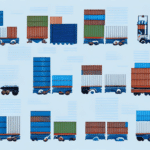Comparing Fulfillment by Amazon (FBA) and Flexport for E-commerce Businesses
Choosing the right fulfillment service is crucial for the success of any e-commerce business. In this comprehensive comparison, we examine Fulfillment by Amazon (FBA) and Flexport, two leading fulfillment providers. We delve into their functionalities, advantages, drawbacks, pricing structures, shipping options, customer support, and suitability for different business sizes. Additionally, we present case studies and conclude with guidance on selecting the best service for your business needs.
Understanding Fulfillment by Amazon (FBA)
What is FBA?
Fulfillment by Amazon (FBA) is a service offered by Amazon that enables businesses to store their products in Amazon's fulfillment centers. Amazon takes care of storage, packaging, shipping, and customer service for these products. This allows businesses to leverage Amazon's vast logistics network and renowned customer service capabilities.
How Does FBA Work?
Businesses send their inventory to Amazon's warehouses. When a customer places an order, Amazon handles the picking, packing, shipping, and even returns processing. This streamlined process allows businesses to focus on product development and marketing while Amazon manages the logistics.
Advantages of FBA
- Access to Amazon's Prime Customers: Products fulfilled by Amazon are eligible for Prime shipping, attracting millions of loyal customers seeking fast and reliable delivery.
- Scalability: FBA supports businesses of all sizes, allowing them to scale operations without worrying about logistics challenges.
- Multi-Channel Fulfillment: FBA can handle orders from other sales channels, such as a business’s own website, using the same inventory.
- Cost Savings on Shipping: Amazon negotiates competitive shipping rates due to its high volume, potentially reducing costs for businesses.
Drawbacks of FBA
- Limited Control: Businesses have limited control over the fulfillment process, including packaging and handling of products.
- FBA Fees: Fees can accumulate based on storage duration, size, and weight of products, impacting profit margins.
- Inventory Management: Mismanaged inventory can lead to long-term storage fees or stockouts, affecting sales and profitability.
Exploring Flexport as a Fulfillment Option
What is Flexport?
Flexport is a modern freight forwarding and customs brokerage company that offers comprehensive shipping solutions for businesses of all sizes. With a focus on technology-driven logistics, Flexport simplifies international shipping through its user-friendly platform and end-to-end services.
How Does Flexport Work?
Flexport manages the entire shipping process, from sourcing carriers and arranging freight pickups to handling customs documentation and providing real-time shipment tracking. Their platform offers detailed analytics, enabling businesses to optimize their supply chains effectively.
Advantages of Flexport
- Comprehensive Logistics Services: Flexport handles all aspects of international shipping, providing a seamless experience for businesses.
- Real-Time Tracking and Analytics: Businesses gain visibility into their shipments with real-time tracking and access to detailed analytics for informed decision-making.
- Global Network: Flexport’s extensive network of warehouses and distribution centers allows for efficient storage and distribution worldwide.
- Commitment to Sustainability: Flexport offers carbon offsetting options and partners with eco-friendly carriers to minimize environmental impact.
Drawbacks of Flexport
- Higher Costs: Flexport’s premium services come at a higher price point, which may be prohibitive for smaller businesses.
- Complexity for Domestic Shipping: Flexport excels in international logistics, but businesses focused solely on domestic shipping might find limited benefits.
- Less Control for Highly Customized Needs: Businesses requiring highly specialized shipping solutions may find Flexport’s offerings less flexible.
FBA vs. Flexport: Fees and Pricing Comparison
Understanding the cost structures of FBA and Flexport is essential for businesses to make informed decisions.
FBA Pricing Structure
- Fulfillment Fees: Charged per unit based on size and weight.
- Storage Fees: Monthly fees based on the volume of inventory stored.
- Additional Fees: Fees for long-term storage, removal orders, and other specific services.
According to Amazon's current fee schedule, FBA fees can impact overall profitability, especially for low-margin products.
Flexport Pricing Structure
- Shipping Costs: Based on shipping method (air, ocean, ground), weight, and destination.
- Service Fees: Fees for customs brokerage, documentation, and additional logistics services.
- Additional Services: Costs for warehousing, insurance, and value-added services.
Flexport offers a custom quote for each shipment, which can be accessed through their contact page.
Generally, Flexport’s fees are higher than FBA’s due to the comprehensive services provided. Businesses should evaluate their specific shipping needs and volume to determine which service offers better value.
Shipping and Delivery Options: FBA vs. Flexport
FBA Shipping and Delivery
- Prime 2-Day Shipping: Eligible products benefit from Amazon’s expedited shipping options.
- Free Shipping: Businesses can offer free shipping to customers, enhancing competitiveness.
- International Shipping: Access to Amazon’s global fulfillment network for international orders.
Flexport Shipping and Delivery
- Multiple Shipping Methods: Options include air, ocean, and ground shipping tailored to business needs.
- Real-Time Tracking: Enhanced visibility into shipments with real-time tracking capabilities.
- Custom Logistics Solutions: Flexible shipping arrangements based on the specific requirements of businesses.
Flexport's focus on international shipping provides businesses with diverse and flexible shipping options, whereas FBA excels in fast domestic delivery through Amazon's established network.
Customer Support: Comparing FBA and Flexport
FBA Customer Support
FBA offers access to Amazon's extensive customer service network, providing support for order issues, returns, and other fulfillment-related queries. However, support is primarily managed through Amazon’s help resources, which may lack personalized attention for specific business needs.
Flexport Customer Support
Flexport provides dedicated customer support available 24/7, including access to logistics experts who can assist with complex shipping issues. This personalized approach ensures that businesses receive tailored support and solutions for their unique logistics challenges.
For businesses that require more hands-on assistance and customized support, Flexport’s customer service may offer a significant advantage over FBA.
Which Fulfillment Service is Best Suited for Your Business?
Best for Small Businesses
For small businesses, FBA is often the more cost-effective and straightforward option, especially if the primary sales channel is Amazon. The ability to tap into Amazon’s vast customer base and offer Prime shipping can drive significant sales growth. Additionally, the scalability of FBA allows small businesses to expand without worrying about logistical complexities.
However, small businesses with an international focus might benefit from Flexport’s tailored shipping solutions, despite the higher costs, to effectively reach global markets.
Best for Large Businesses
Large businesses may find Flexport to be the better option due to its comprehensive logistics support and ability to handle complex international shipping needs. Flexport’s personalized services and global network can accommodate the extensive and diverse requirements of large enterprises, providing greater control and flexibility over their supply chains.
While FBA offers scalability, the limited control and higher cumulative fees might be a concern for larger businesses managing high volumes of inventory.
Case Studies: Success with FBA and Flexport
Success with FBA: Flyte Socks
Flyte Socks, a manufacturer of compression socks, utilized FBA to quickly launch and scale their business. By leveraging FBA’s storage and shipping capabilities, Flyte Socks efficiently managed inventory and fulfilled orders, allowing them to focus on product innovation and marketing. This scalability enabled rapid growth and increased market penetration.
Source: Forbes - How FBA Helped Flyte Socks Scale
Success with Flexport: Ocean Bottle
Ocean Bottle, a sustainable water bottle manufacturer, turned to Flexport for their international shipping needs. Flexport's end-to-end logistics solutions allowed Ocean Bottle to efficiently source materials and distribute products globally. The real-time tracking and analytics provided by Flexport enhanced their supply chain visibility, contributing to operational efficiency and sustainability goals.
Source: Flexport - Ocean Bottle Case Study
Conclusion: Choosing Between FBA and Flexport
Deciding between Fulfillment by Amazon and Flexport depends on your business’s specific needs and priorities. If your primary focus is leveraging Amazon's vast customer base and benefiting from seamless integration with Amazon's platform, FBA is an excellent choice. It offers scalability, cost-effective shipping options, and access to Prime customers, making it ideal for businesses primarily operating on Amazon.
On the other hand, if your business requires comprehensive international shipping solutions, greater control over the logistics process, and personalized customer support, Flexport is the better option. Despite higher costs, Flexport’s advanced logistics management and sustainability initiatives provide significant value for businesses with global operations.
Ultimately, businesses should carefully assess their fulfillment requirements, budget constraints, and growth strategies to select the service that best aligns with their goals. Both FBA and Flexport offer unique advantages, and the right choice will empower your business to thrive in the competitive e-commerce landscape.






















